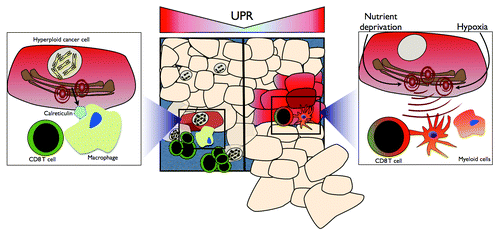Figures & data
Figure 1. The bi-faced role of the unfolded protein response on antitumor T-cell immunity. Hyperploid cancer cells are capable of inducing an antitumor immune response via the unfolded protein response (UPR)-dependent translocation of calreticulin to the cell surface. Cell surface calreticulin promotes macrophage-mediated phagocytosis, ultimately leading to the selective elimination of hyperploid cancer cells by CD8+ T cells (left). UPR-experiencing malignant cells polarize tumor-infiltrating myeloid cells toward a pro-inflammatory/immunosuppressive phenotype characterized by inefficient antigen presentation and CD8+ T-cell cross-priming, ultimately derailing antitumor T-cell immunity and facilitating tumor outgrowth.
